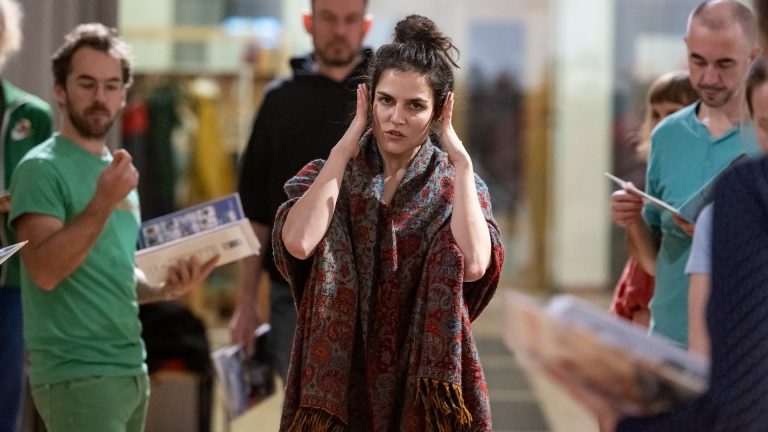On the Night of the Theatres, the Soharóza experimental choir will present its concert titled “Bezzeg” at the Jurányi House. Since November, the group, led by singer-director Tara Khozein, has returned to its roots and started experimenting again with words, sounds and songs. The concert is the result of the five months workshop. We asked the artistic director about the highs and lows of this common adventure.
– What was your first thought when Halas Dóra asked you to work with Soharóza?
– That I’m not a choir director! That I couldn’t possibly have a regular Tuesday night commitment… and that my Hungarian wasn’t good enough. I have quite a lot of experience working as a singer, theater director, and co-creator in performance projects, and as a voice and theater teacher, but I’ve never worked with a choir. As a conductor, I’m barely mediocre, and I know very little about the conventions of choral singing. Also, the last time I sang in a choir was over 15 years ago and it was – and I don’t use this word lightly – traumatic. At the same time, I have been craving a project with a longer life, something to root and challenge my musical practice, and something that has the chance to show long term effects. I think I thought all of these things at the same time.
Dóra was one of the first people I met after moving to Budapest. It was December 31, 2019, and I was just starting to learn Hungarian. She was standing outside Trafó without a coat, and I asked her, “Hideg vagy?” And without hesitation, she just said, “Igen, hideg vagyok.” I always remembered this as a very natural kindness, so I always liked her, but the first actual conversation we ever had was in October of last year when she asked me to lead the choir! I’m still not sure why she thought of me.
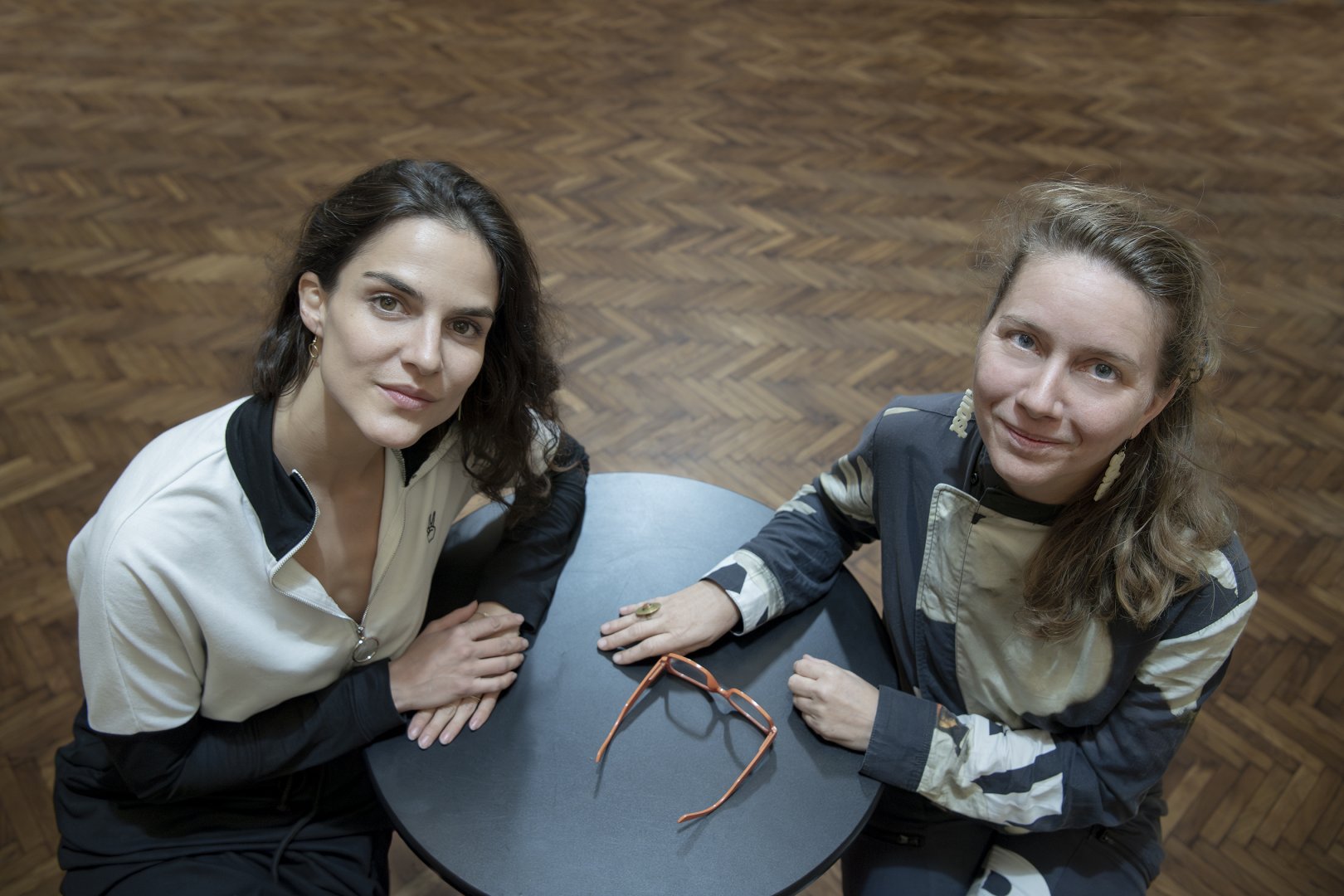
– What did you know about Soharóza before this invitation?
– I had seen Ügy in 2020 and Backpack in 2023, and I knew several of the members. One of them was a voice student of mine for a few months, and I worked with five of them in a documentary theater production called Kolónia with Stereo Akt in 2022… Also, I knew that Soharóza had worked extensively with Nagy Fruzsi, whom I really love… and also that they did a project with Thury Gábor, and also worked with Bartha Márk and Jonás Vera and Rubik Ernő. These are all remarkable, kind people, whose work I respect, and I think that’s not a coincidence. It means that there is an ethos in this ensemble that is attracting interesting artists. So I was seduced.
– When you took the role, what was your goal to reach at the end of the workshop – if you had any?
– I know that to feel creative, I need a lot of constraints. I love attacking logistical problems with poetic solutions. Dóra told me that I needed to make a performance at the end of my term (we actually ended up doing 4!) so I started our process with a big brainstorming session. I had like 40 questions for them that they answered in a quite free and fun way. I asked the choir what they were interested in creatively, what kinds of music, what sizes of ensembles, solo singing, improvisation, extended vocal techniques, physical movement, a collaboration with a designer or a composer… and then I asked them about their burning desires for the choir. They taught me the phrase ’égő vágy’ (burning desire), and this became a kind of touchstone for our process. So if I had any goal, maybe it was to help fulfill some burning desires.
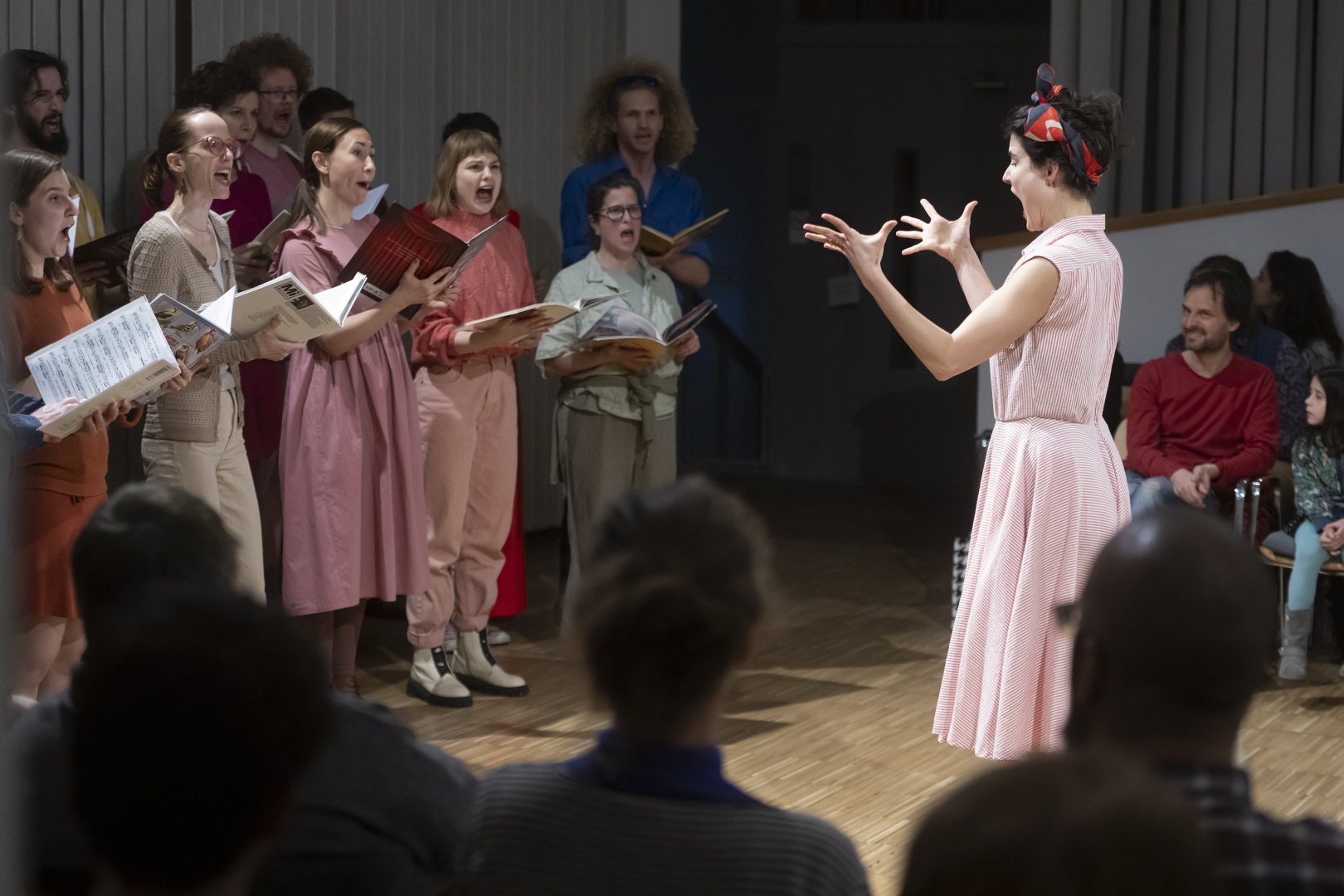
– What was the most surprising during these months of working together with Soharóza?
– How easy it was. They are great listeners, and quite fearless performers, and they all just love to sing, which is evident on their faces. Very often, inspiring musical material exploded out of the exercises I led with them. Even though I was leading in a quite structured and pre-planned way, I often felt like a bystander at rehearsals. There was so much trust and joy inside of it, sometimes I just felt like I was along for the ride. I haven’t ever been in a process like that.
– What was the most difficult in this job for you?
– Ha! The regularity maybe. I had to give up some opportunities to sing because I was in rehearsals. Tuesdays are important nights in the experimental music scene in Budapest, because of the Tuesday night series at Lumen. Shameless plug for Lumen: Donate to help save their music programming!
– Did you learn anything from them that you can bring with you?
– Yes. That choirs aren’t always traumatic! And also that Soharóza is more than people singing together, it’s also a tight knit community, and extends to everyone who has ever been a part of the choir. You can’t really overstate the importance of that… It’s so hard to build community in the society we live in, and music can really help. Singing can really help. I think that’s my burning desire actually: to have a singing community. So I think Soharóza taught me what that can look like.
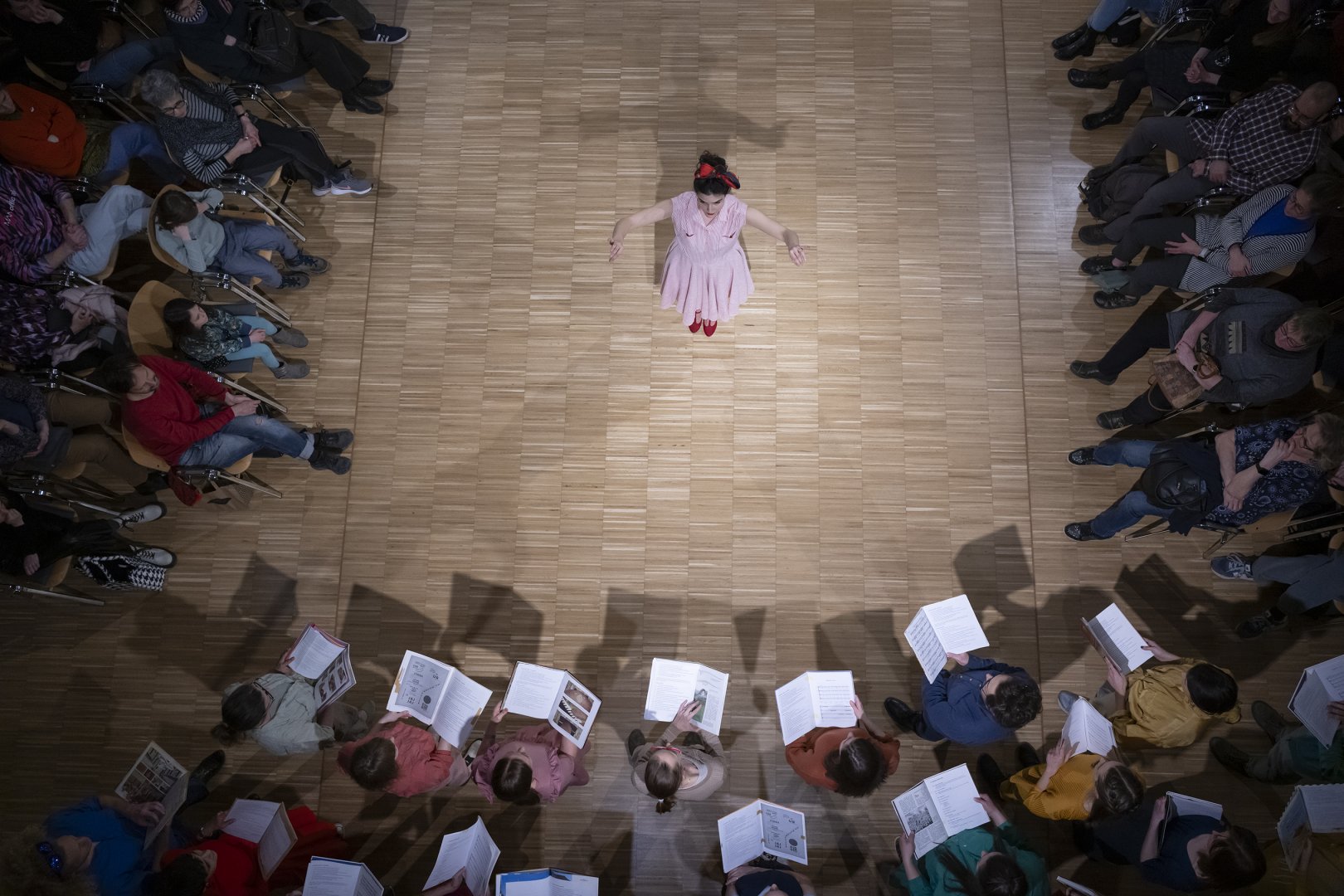
– How the concert Bezzeg was formed? What is this title/word mean to you?
– During a rehearsal in an exercise I asked the choir for a word that wasn’t too obvious, that had a nice sound, and that you could repeat over and over again without starting to hate it. Tárnaki Tamás said bezzeg, and everyone went “uuuuuuuuu”. I had no idea what it meant and no one could explain it to me, but I loved the reaction it got in the room. Later that night it became the name of the concert, in a sort of random chaotic way, when I still didn’t really know what it meant! When I say it this way, it feels a little irresponsible, but I just trusted the instincts of the group. Then I went home and figured out what it meant, and started creating some logic or game rules that grew out of the word, that helped me form our performance. This logic isn’t intended to be understood by the audience, but it gave me enough constraints to be creative.
We also had 4 casual creative meetings at my apartment, where anyone from the choir was invited to come help develop material for the show. I really enjoy this kind of collective dialogue as a way of decision-making. I find it very efficient and fun. In the end, I made many of the final suggestions about order, staging, vocal color, etcetera, but much of the content of the pieces, the text, the costumes, and some of the formal ideas came from members of the choir. The product is truly a collaboration between everyone who participated in rehearsals.
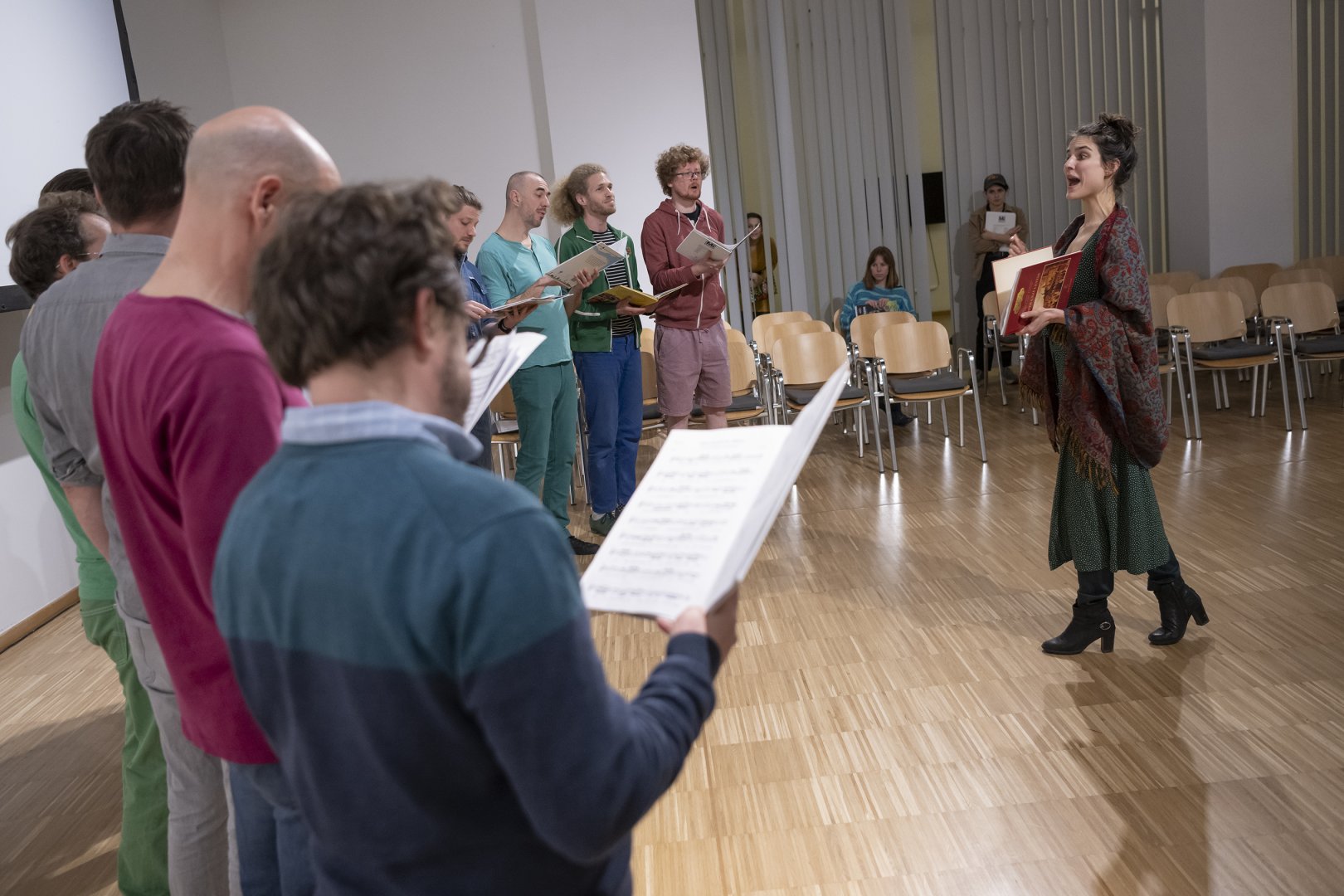
– If you wanted to invite a friend to this concert, how would you describe its content?
– This is a playful choral concert that celebrates untranslatability and the expansive potential of the human voice!
– If Soharóza would ask you to work together again, what would you answer?
– It would be an honor and a pleasure to work with Soharóza again. It is one of the treasures of Budapest’s music scene, and I hope we have the opportunity to make more things together!
Tara Khozein is a soprano who makes concert music and theater. She was born in Ecuador to a mixed Iranian-American family, and has lived, studied, and worked across the US and Europe. As a multidisciplinary performer, she explores the intersections of classical and experimental singing, and physical theatre. She is also a musical director for theater and a performance director for musicians. Now she is living, teaching and performing in Budapest.

